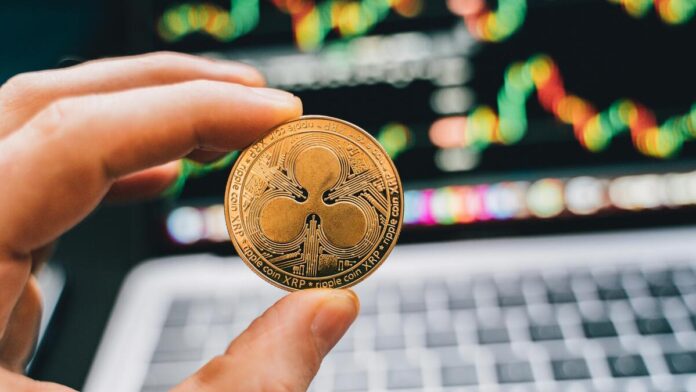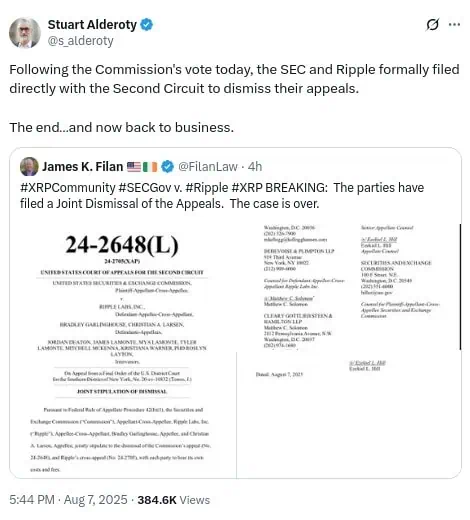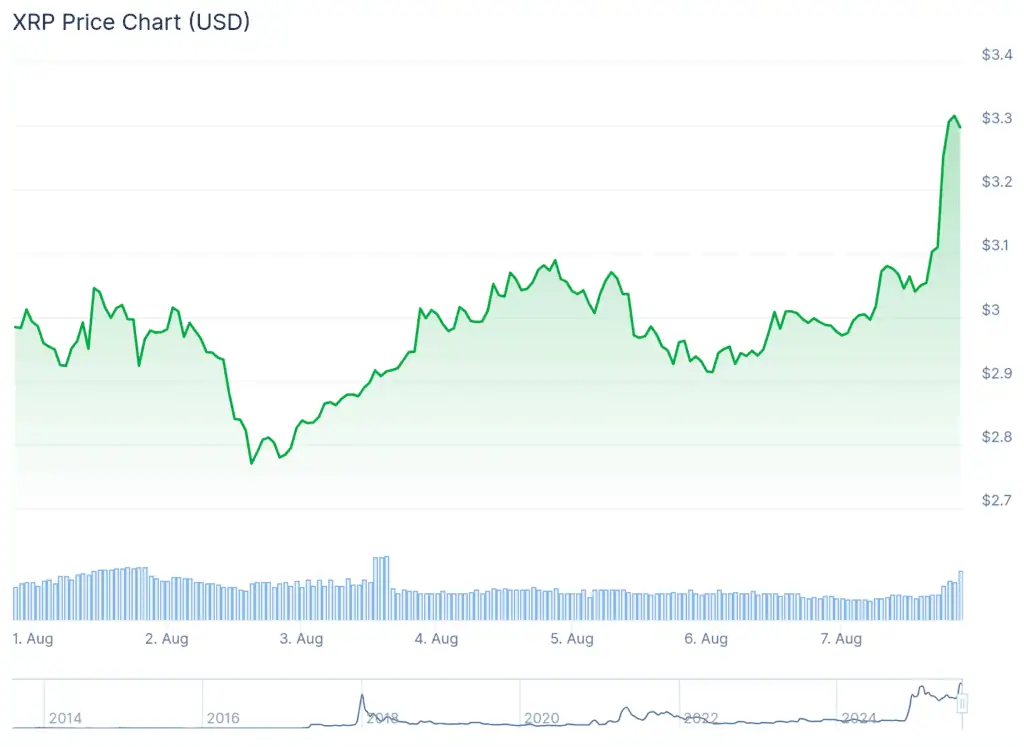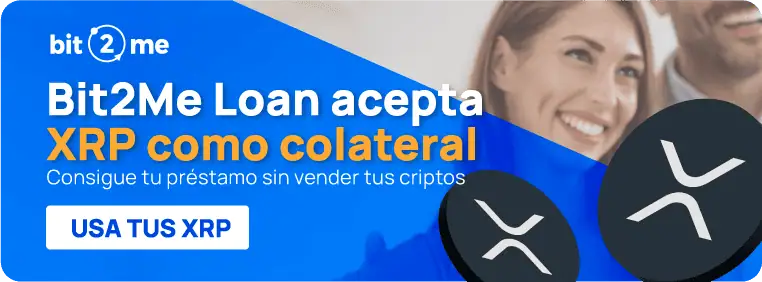
Ripple and the SEC have officially settled their legal dispute after years of litigation. XRP's price rose 10% following the news. What does this agreement mean for the future of crypto?
The dispute between Ripple Labs and the U.S. Securities and Exchange Commission (SEC) has come to an end. On August 7, both parties filed a lawsuit with the Second Circuit Court of Appeals. the joint dismissal of their appeals, formalizing the closure of the case without imposing new sanctions or changes to the previous ruling.
This decision means each party will bear its own legal costs, marking the definitive end to the litigation initiated in 2020, in which the SEC accused Ripple of selling unregistered securities through XRP. It also means that neither Ripple nor the SEC will continue to challenge the previous court ruling or seek new legal proceedings related to this case.
The outcome, widely anticipated by the crypto community, brings with it greater regulatory clarity for XRP and the crypto market in general, considering that this lawsuit had been a source of uncertainty for investors and companies, especially due to the doubt about whether XRP should be considered a financial security.
End of dispute: Ripple and the SEC withdraw their appeals
After years of legal uncertainty, the long-running battle between Ripple and the U.S. Securities and Exchange Commission (SEC) has finally come to an end. Through X, the company's chief legal officer, Stuart Alderoty, announced the formal filing of Ripple's request to dismiss its appeals and indicated that the company is ready to continue growing its business.

Judge Analisa Torres' ruling in July 2023, now final, established that Sales of XRP on the secondary market, i.e. when bought and sold between ordinary users, do not constitute securities offerings., while institutional sales are.
This differentiation turned out to be very positive news for Ripple, as it provides them with a clearer and more reasonable legal framework for operating within the United States, something the crypto community had long been hoping for. Furthermore, instead of facing the $2.000 billion fine the SEC had initially requested, Ripple will pay $50 million, a much more manageable figure than the initial one.
For experts, the closure The end of this legal dispute is not only a relief for Ripple, but also a powerful message for the entire digital ecosystem: Regulation can be balanced, respecting the particularities of the crypto market.The resolution of the Ripple vs. SEC case has been welcomed by investors and enthusiasts, who see it as a significant step toward the normalization and legal stability of the sector.
XRP responds: price soars and the market reacts
The market's reaction to Ripple and the SEC's recent decision was immediate. Following the news, the price of XRP surged more than 10%, reaching $3,30, according to data from CoinGecko. This surge reflects renewed investor confidence and the perception that XRP has overcome one of its biggest legal hurdles.

Source: CoinGecko
XRP's price surge is also linked to institutional interest. Asset managers such as Grayscale, Franklin Templeton, and WisdomTree have filed applications for XRP spot ETFs, suggesting an expansion of regulated access to this digital asset.
BUY XRP ON BIT2MEWith the resolution of this case, XRP gains credibility and security, consolidating itself not only as an option within the decentralized universe, but also as an asset with a firm foothold in traditional finance. Ultimately, this news has been a significant turning point for XRP, as it clears up many doubts about its legal status and paves the way for new opportunities within the market.
The court ruling that redefined crypto regulation
Judge Torres' ruling in July 2023 became a turning point in the finalization of this case. By declaring that programmatic sales of XRP on exchanges are not securities, but that institutional sales are, a precedent was set that could influence future regulatory decisions.
This dual approach allows for a distinction between types of transactions, avoiding a one-size-fits-all classification of tokens. Ripple argued that, under the Howey test, XRP could not be considered a security without an explicit investment contract, a position partially supported by the court.
On the other hand, the resolution of the case has also been interpreted as a sign of institutional maturity. By avoiding prolonging the litigation, both Ripple and the SEC show a willingness to move towards a more functional and less punitive regulatory framework. Therefore, the closure of the Ripple vs. SEC case not only benefits XRP, but also represents a precedent that could facilitate the regulation of other digital assetsThe legal clarity gained allows more projects to operate under defined rules, reducing the risk of protracted litigation.
In addition, the SEC, under the direction of Paul Atkins, has launched the “Crypto Project” to modernize securities regulations applicable to digital assets. This initiative seeks to adapt the legal framework to new technologies, moving away from previous restrictive approaches.
With this new environment, the crypto industry can focus on innovation, institutional adoption, and global expansion. Ripple, for its part, is positioning itself as a key player in the digital transformation of money, integrating blockchain technology with traditional financial infrastructure.
Ripple expands in the market
With the legal dispute resolved, Ripple has doubled down on its commitment to global financial infrastructure. On August 7, the cryptocurrency and blockchain technology company announced the acquisition of Rail Financial for $200 million, a platform specializing in international stablecoin payments. This integration will allow Ripple to offer 24/7 payment solutions with stablecoins like RLUSD. Rail currently processes more than 10% of global stablecoin transactions, so its acquisition will position Ripple as a leader in this sector.
In conclusion, the withdrawal of the appeals by Ripple and the SEC marks the close of a critical phase for XRP. The court ruling distinguishing between institutional and retail sales, coupled with the strategic acquisition of Rail, places Ripple in a prime position to lead the next phase of digital payments with stablecoins.
This outcome not only strengthens XRP's legitimacy but also redefines the role of cryptocurrencies in the global financial system. With greater regulatory clarity, robust infrastructure, and institutional support, Ripple is projected to be a driver of change in the digital economy of the future.



